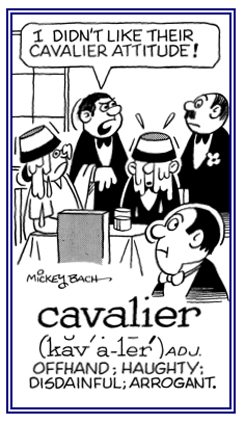caval-
(Latin: horse)
From Latin caballus, "a horseman"; by extension, "a gentleman serving as a lady's escort". Also said to mean: "an inferior horse, a nag". Italian caballeria from caballo, "horse"; French cavalerie.
A series, a procession, or an action of things or people moving forward, especially a spectacular or dramatic one: The actress starred in a cavalcade of Broadway hits.
The cavalcade of musical bands participated in a celebration of the New Year.
1. An armed horseman; especially, a mounted soldier or a knight: "The cavalier rode at the head of the group of ground soldiers, hoping to lead the soldiers to victory and glory."
2. Someone having the spirit or bearing of a knight; a courtly gentleman: "The young cavalier dressed in the high fashion of the court and behaved very nicely towards everyone."
3. A gallant or courteous gentleman; especially, one serving as a lady's escort: "Lady Donna asked Lord Ashton to be her cavalier for the evening at the opera."
2. Someone having the spirit or bearing of a knight; a courtly gentleman: "The young cavalier dressed in the high fashion of the court and behaved very nicely towards everyone."
3. A gallant or courteous gentleman; especially, one serving as a lady's escort: "Lady Donna asked Lord Ashton to be her cavalier for the evening at the opera."
cavalier (adjective), more cavalier, most cavalier
1. An arrogant or offhand disregard for other people: James had a cavalier attitude as indicated by his disdainful or brusque response when the customer asked if she could get someone to serve her at the store.
2. Carefree and nonchalant and not showing any concern: Mildred was disturbed by the waiter's cavalier response when she asked him for more butter for her toast.
3. Showing an arrogant, disdainful, domineering, supercilious, or jaunty disregard or lack of respect for something or someone: Marie's supervisor treated her with a cavalier attitude.
4. Being offhand or unceremonious: The dignified officials were confused by the speaker's cavalier manner.

© ALL rights are reserved.
Go to this Word A Day Revisited Index
2. Carefree and nonchalant and not showing any concern: Mildred was disturbed by the waiter's cavalier response when she asked him for more butter for her toast.
3. Showing an arrogant, disdainful, domineering, supercilious, or jaunty disregard or lack of respect for something or someone: Marie's supervisor treated her with a cavalier attitude.
4. Being offhand or unceremonious: The dignified officials were confused by the speaker's cavalier manner.

Go to this Word A Day Revisited Index
so you can see more of Mickey Bach's cartoons.
A term used by the caravans which crossed the prairies, to denote a hand (group) of horses or mules: "The thieves stole their whole cavallard, consisting of ten head of horses and mules."
cavalry (adjective) (not countable)
Descriptive of soldiers who ride in vehicles or helicopters: "The cavalry units were warned to be prepared for an attack by a terrorist group."
1. Formerly, the part of an army made up of soldiers trained to fight on horseback.
2. The more mobile part of a modern army, using armored vehicles and helicopters.
3. Combat troops mounted originally on horses but now often in motorized armored vehicles for greater mobility.
2. The more mobile part of a modern army, using armored vehicles and helicopters.
3. Combat troops mounted originally on horses but now often in motorized armored vehicles for greater mobility.
Sometimes cavalry is misspelled as calvary which refers not to horses but to the name of the mount (or hill) just outside the city walls of ancient Jerusalem where the Crucifixion of Jesus Christ took place, according to the Bible; from Latin calvaria, "skull", from Greek golgotha, translating Aramaic gulgulta, "place of the skull".
1. Previously, a soldier mounted on horseback: "Hank was a cavalryman who always took good care of his mount."
2. Now, a reference to a soldier, or soldiers, in a motorized army unit: "The two groups of cavalrymen were assigned to prepare for an attack by the enemy who were approaching the area."
2. Now, a reference to a soldier, or soldiers, in a motorized army unit: "The two groups of cavalrymen were assigned to prepare for an attack by the enemy who were approaching the area."
Related horse-word units: equ-, equi-; hippo-.
<img src="/img/left_arrow_sm.gif" alt="" /> <img src="/img/right_arrow_sm.gif" alt="" />
Showing 1 page of 7 main-word entries or main-word-entry groups.
